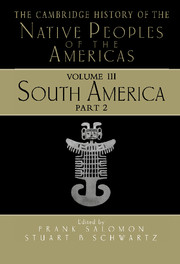Book contents
- Frontmatter
- Contents
- Illustrations
- 14 The Crises and Transformations of Invaded Societies: The La Plata Basin (1535–1650)
- 15 The Colonial Condition in the Quechua-Aymara Heartland (1570–1780)
- 16 Warfare, Reorganization, and Readaptation at the Margins of Spanish Rule: The Southern Margin (1573–1882)
- 17 The Western Margins of Amazonia from the Early Sixteenth to the Early Nineteenth Century
- 18 Warfare, Reorganization, and Readaptation at the Margins of Spanish Rule – The Chaco and Paraguay (1573–1882)
- 19 Destruction, Resistance, and Transformation – Southern, Coastal, and Northern Brazil (1580–1890)
- 20 Native Peoples Confront Colonial Regimes in Northeastern South America (c. 1500–1900)
- 21 New Peoples and New Kinds of People: Adaptation, Readjustment, and Ethnogenesis in South American Indigenous Societies (Colonial Era)
- 22 The “Republic of Indians” in Revolt (c. 1680–1790)
- 23 Andean Highland Peasants and the Trials of Nation Making during the Nineteenth Century
- 24 Indigenous Peoples and the Rise of Independent Nation-States in Lowland South America
- 25 Andean People in the Twentieth Century
- 26 Lowland Peoples of the Twentieth Century
- Index
15 - The Colonial Condition in the Quechua-Aymara Heartland (1570–1780)
Published online by Cambridge University Press: 28 March 2008
- Frontmatter
- Contents
- Illustrations
- 14 The Crises and Transformations of Invaded Societies: The La Plata Basin (1535–1650)
- 15 The Colonial Condition in the Quechua-Aymara Heartland (1570–1780)
- 16 Warfare, Reorganization, and Readaptation at the Margins of Spanish Rule: The Southern Margin (1573–1882)
- 17 The Western Margins of Amazonia from the Early Sixteenth to the Early Nineteenth Century
- 18 Warfare, Reorganization, and Readaptation at the Margins of Spanish Rule – The Chaco and Paraguay (1573–1882)
- 19 Destruction, Resistance, and Transformation – Southern, Coastal, and Northern Brazil (1580–1890)
- 20 Native Peoples Confront Colonial Regimes in Northeastern South America (c. 1500–1900)
- 21 New Peoples and New Kinds of People: Adaptation, Readjustment, and Ethnogenesis in South American Indigenous Societies (Colonial Era)
- 22 The “Republic of Indians” in Revolt (c. 1680–1790)
- 23 Andean Highland Peasants and the Trials of Nation Making during the Nineteenth Century
- 24 Indigenous Peoples and the Rise of Independent Nation-States in Lowland South America
- 25 Andean People in the Twentieth Century
- 26 Lowland Peoples of the Twentieth Century
- Index
Summary
In the early years of the twentieth century, scientists in the Tarapacá desert of Chile’s Pacific shore found the mummified corpse of a colonial native nobleman, a cacique. They were able to date the mummy precisely because he carried in a pouch a 1680 document certifying that the deceased had paid “the papal bull for the holy crusade.” This tax entitled those who paid it to indulgences that would shorten their stay in Purgatory. To be buried in an ancestor cave according to the ancient rites, it seems, colonial Andeans felt one also had to obtain the promise of Christian salvation. This idea marks one of the stages in the long process of integration that took place in the course of hispano–Andean colonial coexistence. The same cultural complexities that the dead man’s family apparently envisioned in terms of an Andean-Christian afterlife, make it hazardous to analyze the colonial experience of daily life. This chapter concerns the transformations experienced by the indigenous Andean populations from Pasto (in southern Colombia) to Tucumán (in northwestern Argentina), from the reforms of Viceroy Francisco de Toledo (1569–1581) to the Túpac Amaru II wars of 1780 (see Map 15.1). Toward the end of this era, most of these peoples were still Aymara, Quechua, and Pukina speakers, and they still lived in recognized native polities – about 1.5 million persons, 400,000 of whom paid tribute in 1750 – but they had become bearers of a culture and social organization so transformed that the depths of change still resist historiographic conceptualization.
A thorough bibliographical survey shows that despite innovative recent work we still know very little about most of the stages in this long-term development, from the thematic, as from the regional point of view. Hence any synthesis of the colonial history of the Andean world is bound to be premature. The outline formulated here is provisional and attempts to trace only those few trends that appear to be most significant. It proposes a global explanatory framework at some expense of nuance and caution.
The central thesis can be stated in a few words. Once the overarching integrity of Andean hierarchical control had been destroyed (especially upper-level organizations like the Inka and macroregional states and cults), domestic units took over many control functions. Domestic economy came to ensure economic coherence by handling mercantile and nonmercantile exchanges and by sustaining social cohesion.
- Type
- Chapter
- Information
- The Cambridge History of the Native Peoples of the Americas , pp. 59 - 137Publisher: Cambridge University PressPrint publication year: 1999
- 17
- Cited by



